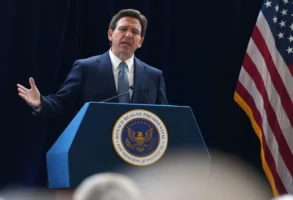
Published July 6, 2021
A July 5 New York Times Op-Ed by Kmele Foster, David French, Jason Stanley, and Thomas Chatterton Williams argues that it is “un-American” for state laws to keep indoctrination in the tenets of critical race theory (CRT) out of the K–12 curriculum. While conceding that such laws may be permissible in the “narrow context of public primary and secondary education,” they argue that said laws are “antithetical to educating students in the culture of American free expression.” While the authors raise some legitimate concerns about specific provisions in bills that have passed to date, their conclusions do not follow. Many of the specific problems they point to can and should be fixed. The overall effort to prevent CRT indoctrination, however, is both necessary and justified. It is CRT that is un-American, not efforts to prevent the imposition of this pernicious orthodoxy on schoolchildren.
Let us begin with specific legislative language, then move to broader principles. I focus here on Texas House Bill 3979, inspired in significant part — but by no means entirely — by my model legislation published with the National Association of Scholars. That Texas bill has some technical flaws, which were well on their way to being fixed as the legislative session wound down. The flaws of which the op-ed complains can and should be addressed when House Bill 3979 is taken up soon in a special legislative session.
Texas House Bill 3979 initially passed the House. After it reached the Senate, a key fix was made. The original House version held that the various illiberal concepts listed (e.g., collective guilt by race or sex) should not be made “part of a course.” This phrasing could potentially prevent even discussion of the various concepts, which would indeed run afoul of our culture of free expression, despite being legally permissible. In contrast, my model legislation merely says that teachers should not teach the various illiberal concepts in such a way as to inculcate them. Anything can be discussed. The core concepts of critical race theory, however, should not be presented as worthy of assent and belief. In other words, students should not be indoctrinated with CRT.
I advocated for tweaking the House version along these lines early on. And in fact, when Texas House Bill 3979 moved to the Senate, the switch to “inculcate” was made. That change speaks to yet another concern of Foster, French, Stanley, and Williams. With the new language, the Texas bill would not bar any teaching that leads to student “discomfort, guilt, or anguish,” an excessively subjective standard. On the contrary, the law would simply prevent teaching students that they ought to feel guilt or anguish on account of their race or sex. Arguably, the current language already does this. Yet the addition of “inculcate” would make that clearer still. The problem is that the technical fixes of the Senate version were lost due to an unrelated procedural challenge in the final days of the session. At that point, the Senate bill was struck down by the parliamentarian. That meant the only way to pass a law before the session ended was to adopt the House version and leave the fixes for a special legislative session, which is now on tap.
Another complaint lodged against the Texas bill by Foster, French, Stanley, and Williams is that it bars any classroom from requiring “an understanding of the 1619 Project,” and thus assigning any part of it as required reading. Here again I agree with the authors’ narrow point. This language is not in the NAS model, and I think it was mistaken to include it in the bill. We should not be barring the discussion or understanding of concepts, only the teaching of them as truths to be embraced. Even to properly oppose the 1619 Project, you must first understand it. Also, the 1619 Project includes an unobjectionable essay about black jazz. Who knows what other similar unobjectionable materials may be issued under the imprimatur of the 1619 Project in the future. For that reason, the best strategy is to prevent attempts to teach as truth the 1619 Project’s assertion that advent of slavery was the “true founding” of the United States. This, in the main, is what the Texas bill does. The language barring “an understanding of the 1619 Project” is unnecessary and problematic, and I hope it is removed in the special session.
While I can agree with many of the specific concerns itemized by Foster, French, Stanley, and Williams, their objections in no way cut to the heart of the issue. In fact, in my recent piece advocating for state-level legislation against CRT, I noted that a bill currently being considered in Ohio avoids the sort of concerns raised by Foster, French, Stanley, and Williams.
These authors make quite a concession when they recommend filing federal lawsuits and civil-rights complaints against CRT. Implicitly, this acknowledges that much of CRT-infused education violates the core principles of classical liberalism upon which our constitutional system is based, as well as federal law. Unfortunately, attempting to parry CRT via lawsuits or complaints to the federal Department of Education is a futile strategy, not least because the Biden administration’s Department of Education itself is planning to impose CRT on America’s schools, just as Obama imposed Common Core.
Lawsuits against campus-speech codes and so-called free-speech zones almost invariably succeed. Nevertheless, we’ve had restrictive speech codes and speech zones on our college campuses for decades. In practice, the legal strategy fails because colleges tweak their codes, write off penalties as a cost of doing business, and find other ways to suppress speech. Resort to that failed strategy will do little or nothing to hold back the tide of CRT. This is especially so since the combination of several federal “civics” bills with the new Biden rule promoting the 1619 Project and CRT is likely to nationalize CRT-based curricula in the near future.
While I support state-level bills to combat CRT indoctrination, it took me some time to adopt that view. The initial version of my model legislation was designed to bar protest civics, and to bar CRT training of teachers. It did not, however, address the K–12 curriculum. I believed then, and still believe, that the downside of curriculum legislation will be he said/she said disputes between teachers and parents, and an aura of martyrdom for advocates of CRT. Two things changed my mind, however, about the need to address the curriculum by law. First, with the Biden administration itching to impose a CRT-infused curriculum, states have no choice but to act quickly in self-defense. Second, telling young children that they bear guilt on account of their skin color is an intolerable affront that cannot wait on decades of whack-a-mole lawsuits for resolution.
This brings us to an issue that Foster, French, Stanley, and Williams gloss over far too quickly. The authors act as though the authority of states over the content of K–12 education is a minor legal technicality. It is not. K–12 teachers do not have the academic freedom that college teachers do, and for a profoundly important reason. Primary and secondary students in public schools are a captive audience. Teachers cannot and must not be allowed to impose their personal politics on children and families legally compelled to use the public-school system (or shoulder significant financial burdens), especially when that involves outrageous and illiberal assaults on our most cherished principles.
K–12 students are minors. They are vulnerable to a teacher’s authority in a way that college students are not. Telling minors that they should feel guilt or responsibility because of their skin color is a line that should not be crossed by any school district in these United States. Sadly, while some states will surely allow this to occur, it is well within the authority of other states to prevent this abuse if they see fit, for every good reason.
The flaws of the early bills can and should be remedied. The authors, however, are wrongly using these fixable flaws to adjudicate a more portentous issue. The education of children is rightly a matter for democratic decision-making in a way that the college classroom is not. With indoctrination slipping its campus redoubt to strike at America’s schoolchildren, the game has rightly changed. The acolytes of CRT have traveled a bridge too far.
Stanley Kurtz is a senior fellow at the Ethics and Public Policy Center.








